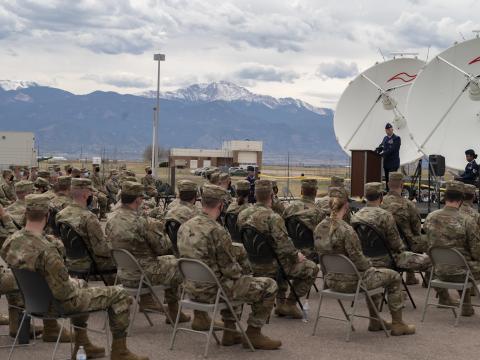Swedish Government Sets Fast Technology Pace
An earlier version of the Ericsson Tower Tube also is made of flexible concrete that can be colored and branded to meet specific operator needs. The tower replaces conventional telecommunications sites, and a radome or weatherproof enclosure protects the radio and antenna equipment inside.
Long distances and harsh climate drive Swedes to their computers for constant communication. 
The public sector and industry are collaborating to catapult Sweden into becoming one of the world’s most information technology-savvy nations in the world. Contributions to this progress have been coming from all segments of the population. New government leaders are setting substantial technology goals for the country to achieve as a whole. The armed forces not only are preparing their troops with home-grown technologies but also taking part in NATO operations, which requires them to keep up with advances in other nations. And, up-and-coming small- and mid-size businesses are creating innovations that soon-to-be-renovated law will allow them to sell to a longer list of buyers.
One concrete indication of the high importance Sweden places on information technology is the stated priorities of its recently appointed minister for information technology and regional affairs, Anna-Karin Hatt. Her primary goals for Sweden include putting technology into citizens’ hands, making progress in education, creating jobs, and developing a liberal policy that examines the strengths of each region and then draws upon those strengths.
According to Hatt, the country has been successful in the growth of information technology, but she adds that to continue this growth requires continued development of information systems. In the near future, she will focus on increasing the cooperation between the public and private sectors. Also at the top of her list is to develop a digital agenda for Sweden. While her country has been active in putting a digital agenda into place for Europe, more work in this area is needed specifically for Sweden.
Progress began at the end of the 19th century when the country began its shift from an agrarian- to industrial-based economy. Technology was the natural growth market in a country that is physically large. Sweden has a population of approximately 9.2 million people spread out and living in significantly separated locations. Its citizens and government made a concerted effort to catch up with the technology revolution. The result is a country that is outpacing many others that had slowly and steadily advanced into the information age.
Like most developed countries, workers in Sweden depend on information technology both in their homes and at their offices. One of the Swedish government’s goals is to create more jobs in the information systems field.
A Global Information Technology Report 2009-2010 developed by the World Economic Forum indicates that Sweden ranks number one in the Network Readiness Index (NRI) when compared to 132 other countries. A nation’s index position is based on three general categories—environment, readiness and usage—and each category features three subgroups that examine the role of information technology more specifically. In the environment area, the organization gathered data about the market, politics and regulations, and infrastructure; data reflects individual, business and government readiness in the latter two categories. Sweden landed in first overall because of its consistent position in the top 25—often top 10—in several categories. 
Lt. Gen. Jan Jonsson, SWAF (Ret.), a consultant in the defense arena in Stockholm, explains that technology runs deep in Sweden’s history. The country’s communication technology began with Lars Magnus Ericsson, who opened a telegraph equipment repair shop in 1876. Ericsson understood the power of the telephone—and of technical quality—and helped make Stockholm the most telephone-dense city by the late 1800s.
Later, simple computers were built, followed by more advanced computers. U.S. companies recognized that Sweden was a potentially fertile marketplace because of its large land area and the distance between populated areas. This environment meant that the citizens needed to communicate in more ways than just by telephone, Gen. Jonsson explains. Advances came quickly, and today most homes have at least one computer connected to the Internet, and many have more than one. Even the general prefers using Skype rather than telephone to communicate.
Initially, the general had to rely on satellite communications for voice connections to run military operations. Today, wherever the Swedish military travels in the world, its warfighters have telephones that are connected to the Swedish network. They are allowed to use the telephones as they like as long as enough bandwidth is available. In addition, warfighters also use Skype to keep in touch with their relatives, Gen. Jonsson shares.
In addition to the size of the country, the general points out that the country’s climate predisposes it to seek different ways to communicate. While voice communications are good at times, companies and clients need to be able to see each other to better understand one another. “You lose a lot if you don’t see them. I can sit here and work up to 80 percent of my consulting job using only my computer and only occasionally meeting with clients in person,” Gen. Jonsson says.
Reliance on computers for communications is not new to the general. During his nearly 38 years in the military, he depended on them in his role in operations. His first computers at the beginning of his military career did not even feature a disk drive but instead relied on tape as backup. But by the time of his retirement, Gen. Jonsson was the director of operations for the Swedish armed forces. “I’ve been using all the tools: land, naval, air and special forces,” he allows.
On the operations side, the Swedish armed forces do not bring all of their specialists into an operations area. Instead, they employ reach-back capabilities that use encrypted lines to stay connected with subject matter experts located in Sweden, he relates.
In terms of the Swedish military and its government, the country began transforming technologically approximately 15 years ago, when its involvement in military operations took on an increased NATO flavor. Sweden had to adapt to the NATO standard and did so by increasing its training programs, participating in NATO exercises, and attending NATO’s schools. The country gradually changed the way it plans operationally, and it now conducts and plans operations smoothly to the NATO standard, the general says.
An example of the progress that the NATO nations have made was the initial entry into Kabul, Afghanistan. When Swedish forces landed with special operations forces from the United Kingdom, the first call came from Stockholm because Ericsson had set up the communications system and linked the troops and military leaders through the city. “We [the Swedish armed forces] used them until our own communications came up, and then we went with the technologies the other entities [other nations’ armed forces] brought in,” Gen. Jonsson explains.
Now that he is working on the commercial side of the information technology arena, the general has found that dealing with government agencies usually takes longer than doing business within the commercial sector. He has realized that corporations are more willing to invest in developing new capabilities even though doing so almost always involves challenges.
While countries worldwide have been experiencing the economic downturn during the past several years, Gen. Jonsson says that the Swedish government helped ensure that its economy would not be hard hit by such changes by borrowing very little if any money from other nations. This has resulted in a solid national economy, which has produced a strong marketplace for information systems, he adds.
As AFCEA Stockholm Chapter president, Gen. Jonsson is making sure that members are able to keep up with the changes taking place throughout the country. The chapter, which was established in 1989, has 465 members, slightly more than half of whom work for industry. The officers hold an annual planning meeting at which they decide the events for the upcoming 18 months. As with other AFCEA chapters, the Stockholm group conducts monthly meetings that feature a speaker; these are typically held in the evening.
In the past, every year the chapter held two seminars that began after lunch and lasted until late afternoon. However, with the increase in attention to information technology, the chapter’s leaders have decided to increase the number of conferences to three in 2011, Gen. Jonsson relates.
The first event will focus on information warfare not only in the military sector but also on the commercial side. “It’s not just the military that is involved in it [information warfare], but companies as well,” the general points out.
The second seminar involves the European Defence Agency, the European Union’s export support agency. Currently, discussions are underway about how to facilitate selling military products to customers other than defense acquisition organizations. The general himself has been involved in drafting new legislation to increase the openness of the marketplace. He emphasizes that the government will not lose control by changing the export laws, but it will make it easier for companies within the European Union to sell their products to countries within the continent.
“We see a slow but steady development toward a situation similar to the United States. The whole country comprising states is able to sell products within the nation. Today, European companies can sell their products to each other; however, the defense industry has been excluded from this,” Gen. Jonsson explains.
In his opinion, the new export laws should apply not only to technology but also to consultants and technical assistance. The changes likely will be implemented within the next three years, he adds.
A crisis management scenario will be the focus of the chapter’s third event next year. Gen. Jonsson explains that an organization similar to the U.S. National Guard does not exist in Sweden. “We [the armed forces] do not have the lead, but we have the tools and competencies necessary for handling a national emergency,” he states.
For example, three years ago, 850,000 people were without power because a snowstorm downed trees that fell on power lines. The Swedish Armed Forces were the first to respond to this crisis by connecting 1,500 military, government and industry personnel via communications lines. Once high-level connectivity was established, the utility companies and other emergency personnel were able to do their jobs to reconnect citizens. As a result of experiences like these, the chapter’s leaders decided that it would be helpful to walk members through a similar scenario to prepare them to work together in the future, the general says.
WEB RESOURCES
Swedish Armed Forces: www.forsvarsmakten.se/en
European Defence Agency: www.eda.europa.eu
Government Offices of Sweden: www.sweden.gov.se
AFCEA Stockholm Chapter: www.afcea.org.se



